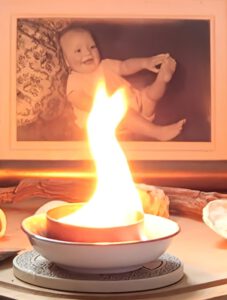All happy families are alike; each unhappy family is unhappy in its own way.
Leo Tolstoy, Anna Karenina
The greatest burden a child must bear is the unlived life of its parents.
Carl Gustav Jung
Family relationships trigger childhood wounds, and those wounds often trump our rational thinking. We can’t ‚rationally‘ transcend the kind of primal pain that such relationships can arouse.
Marrianne Williamson
It may be said that no two children have exactly the same parents, in that the parenting they each receive may vary in highly significant ways. Whatever the hopes, wishes or intentions of the parent, the child does not experience the parent directly: the child experiences the parenting.
Gabor Maté, Scattered
How much unhappiness can there be in any one family? How does this unhappiness shape the development of the children, and their children in turn? Such questions address a topic that gets scant attention in our public discourse, namely the effects of family dysfunction in our formative years, the need to transcend the wounds of childhood adversity, and how we can blossom into our full potential in adulthood.
Take a case close to my heart. A boy born into an already stressed family system, the fifth child after the arrival, in rapid succession, of two boys followed by two girls.
The parents, both having grown up in large bred-in-the-bone Irish Catholic families, are doing their very best. They appear to be somewhat overwhelmed, adjusting, directly after marriage, to the alien culture of a foreign jurisdiction. Father is running his first business, a medical practice serving the local community and Mother longs for the company of her own extended family of origin, living over a hundred miles away.
Legacy issues, skeletons in the closet, are sensed but never discussed. The sudden death of their best man less than two months after their wedding, almost a decade previous. He was the beloved younger brother of the groom, a boy in his mid twenties. Emotional incapacity prevents grieving.
Then there were the military careers of both grandfathers, including encounters with direct combat, experiences all kept well under wraps. Other, lesser-known stories of addiction and suicide among the grand-uncles and their predecessors in this confluence of two remarkable, extensive, extended families.
As young children, both parents had been separated from their beloved parents and siblings, sent to boarding school, as was the custom of their class. We now know those experiences may have been less than pleasant, even downright abusive, for the children of that era.
Then, a year into this boy’s incarnation, disaster strikes. An accident, leading to a serious eye injury of the father. Perhaps due to lack of confidence or fear of exposure to liability, the business is no longer a viable proposition and is wound down. Traces of defeat?
New employment is sought, this time back in the home jurisdiction. Father is away for several months, first in hospital convalescing from the accident, and later searching for and, subsequently, getting up to speed in a new job. This job pays a quarter of his previous salary. He takes his place on a lower rung in a state-sponsored public health hierarchy.
A miscarriage occurs around this time. Presumably, a girl, a beautiful soul to whom the little boy had already established a deep etheric bond before it so cruelly ruptured. Gone, from one moment to the next. Pantomime grieving, beyond consciousness.
A move to yet another strange town, this one windswept, grey, and rainy. Cramped conditions in tenuous rented accommodation. The older boys disappear, to boarding school, as later transpires. This relieves the cramped living conditions somewhat. The protagonist is now the only male child at home until his next younger sibling is born, one season before his third birthday.
Then, with Irish Catholic regularity, two more boys, one every two years. At the age of seven, before the family moves, yet again, this time into more spacious, if senescent, surroundings, there are eight children plus parents living in a compact three-bedroom house.
The estate in which this house is located is spacious, pleasant, calm, and teeming with children. The boy doesn’t get to enjoy the tribal activities as much as he would like because there are always younger siblings to be looked after at home, or chores to be carried out. Still, he likes the estate, especially the river and the forest, and feels at home there. He escapes the warren as often as possible.
Bullying becomes a topic at around this time. Within the home, at school, and on the estate. The boy is awkward, frail, and insecure. Suppressed anger comes out sideways and the most vulnerable always come off worst. Children can be most cruel. In the pecking order, misdeeds get passed along. The adults who could and should provide shelter seem to be otherwise occupied.
Then the move. Now living on a major thoroughfare just outside the city centre, all the freedom of roaming around hunting monsters and building tree houses suddenly gone. It is a new world, loud, hectic, encumbered. The strait-laced air of the newly attended Jesuit school adds to the gloom.
The `new ´ house, a relic from the mid 19th century, requires renovation and there is no budget. The children are seconded for unconventional duties, as painters, decorators, roofing handworkers, plumbers, and heating technicians. There is always something broken, always a drip from a tap or through the roof.
Some months later, Granny dies suddenly of a stroke. Mammy is distraught as never before, cut off from her own siblings and overwhelmed by her circumstances. Two more children arrive in the following four years. The decimal dozen is full.
`You are the cause of my deep unhappiness´, is the message picked up clearly by the boy during this complex, chaotic childhood. `But for you, things would be much better´ he understood this to mean.
The message seemed to reach the boy in a predominately subliminal manner, though it sometimes found open expression in the heat of the moment, through Mother.
She wore her heart on her sleeve. Fits of emotional meltdown were often displayed, a stark counterpoint to her emotional unavailability to the sensitive child yearning for tenderness, appreciation, and affection.
Father’s unhappiness was better guarded, to the point that onlookers might have been surprised to find it at all. Yet, it seems his grief and unhappiness were deeply concealed, perhaps even intensified for his inability to alleviate hers.
Looking back, the boy sees that he happened to be at the `wrong´ place at the `wrong´ time. It was nothing personal. Had he been born elsewhere in the constellation, things might have been very different. Now, looking back, he sees that there is no `right’ or `wrong´. It is what it is. We get to play the cards we are dealt.
In those childhood circumstances, he clams up emotionally. He is on a war footing with mother and is intent on winning this war, taking no prisoners. Even the bonds of war are preferable to the pain of abandonment. Yet he longed for her loving embrace. Between emotional eruptions, she seems petrified, incapable of introspection, self reflection, or bonding. Perhaps that was simply the way it was with her. He was baffled.
With Father, the story was different. The boy did his utmost to tune into Father’s world, so he could discuss, at leisure, universal affairs, eternal and current; Jesus Christ, Gandhi, Aleksandr Solzhenitsyn, the emergence of OPEC, and our very own on-going civil war, otherwise known as `The Troubles´. He basked in the sunshine of Father’s attention during such exchanges, which helped him forget his latent fears of Dad’s unpredictable periodic wrath.
Father’s candle burned out by the age of 51, when the boy was 16. Mother’s five years later. Exhausted, jaded by the clamours of life and all that deep grief and unhappiness that seldom saw the light of day. The boy’s sensitivity ensured that he could never not pick up such vibrations, day or night. There was no escaping their signals, always palpable just below the surface.
At Father’s funeral, he wondered why it couldn’t have been her in the coffin instead. Shocked by and ashamed of the depravity of his own thoughts, he stuffed them deep down inside, hoping they would never again see the light of day.
Yet he knew they were there. He carried the burden of having been a burden from day one. He was, so he was led to believe, the guilty one, the cause of the deep unspoken unhappiness in that family, the family he so dearly tried to pacify and hold together, only to witness its implosion and fragmentation in the space of a few short years.
Fragmented himself, he ran for the hills. He knew if he stuck around, he would soon go under. He began to run and found himself running for weeks, months, then years, finally decades.
He has stopped running now, got exhausted, ran out of steam, and arrived at a turning point where a decision had to be made. Was it going to be a continuation of the No to life, or an embracing of the Yes. He chose the latter.
Turning around to face what he had been avoiding all along, he recognised the wound, the original sin inculcated in his childhood self and later self-perpetuated when he became his own prison guard on death row. The accusation of having been guilty of causing another’s unhappy demise.
Recovery proceeds slowly. Abstinence from whatever mind-altering substances or behaviours is the starting point, allowing the physical, emotional, and spiritual fog to lift.
The lifting of the fog allows us to see what really transpired in those early years. Shifting from the mind to the heart, we begin to appreciate the scars that childhood has left in its wake. With the encouragement of others walking the same path, we establish the willingness to revisit that childhood, feel again some of that original pain, and grieve.
The grieving of the losses of childhood may first appear to be a daunting, monumental task. Even monumental tasks, taken one day at a time, become daily tasks. The loss of childhood innocence and playfulness, all the missed hugs, the consoling words of encouragement never heard, the joys of simply being never celebrated, the warm smiles not seen, years spent in solitary confinement, the list could go on.
With practice, grieving gets easier. That is not to say it gets less painful or discomforting. It simply becomes one of the many resources in our toolkit of daily practice. Practice makes progress, on the journey towards emotional sobriety.
Grieving opens the portal to true compassion, forgiveness, and accountability.
Compassion has two false friends, which masquerade as the real deal. The first is pity. Whether self pity or pity for others, it disconnects by placing us on different unbridgeable levels.
The second is the state of feeling overwhelmed, which also fosters isolation. When we are subject to incapacitating emotional or mental stress, our hearts constrict, and we cannot form or maintain real connections.
True compassion is not only the capacity to walk in another’s shoes, but also the heartfelt desire to contribute to the alleviation of that person’s difficulties in some small way, that they might be overcome, transcended, and transformed into gifts.
Forgiveness is an act of liberation. The principal beneficiary is the one who forgives. It is not to be confused with condoning a person’s behaviour. It is the recognition that we are all children of the same Great Spirit, doing the best we can with what we’ve got. That we all screw up. The older this boy gets, the more he sees himself in his parents and his parents in self. His heart expands in proportion to the suffering that reveals itself to him.
In our human imperfection we are perfect, not because all goes well, but even when things go awry. Extending this compassion and forgiveness from the heart, after revisiting the original pain residing within, is a key step in recovery.
When it comes merely from the head, in the form of an intellectual exercise, the diversion of spiritual bypassing entraps us and will soon find ourselves back at the starting line once again.
Accountability brings balance to our perception and kindness to our responses. We learn that, while we are each responsible for our happiness, there are many ways we can and do impact each other. As we override the fear-based reactive scripts of old, the conscious choice of responding in loving-kindness is something we can develop and cultivate, one day at a time.
Recovery, we are reminded, is not principally about feeling better. It is about getting better at feeling.









